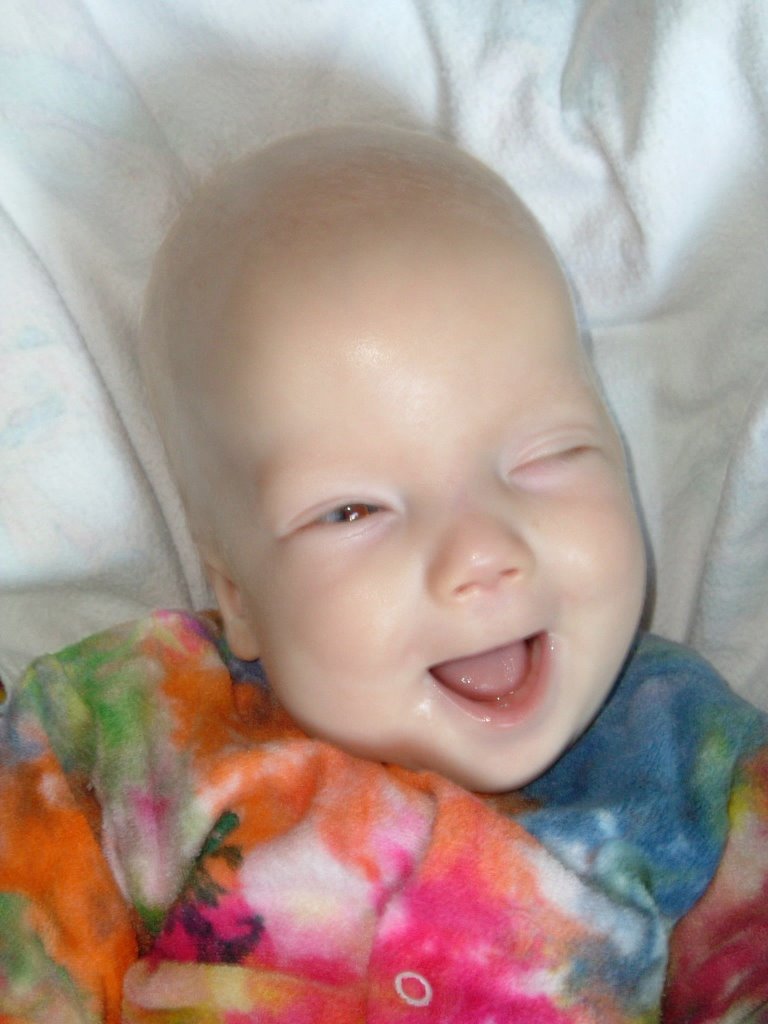A new lease on life for brain damaged children
The 11 candles on the cake are lit and all eyes are on the little girl with blond hair, cornflower blue eyes and flawless skin as they start singing 'Happy Birthday' to her. Her response, as always, is to break into peals of delighted laughter.
The cake is just the accessory to the act; it’s the music that 11-year old Rebekah Ryan adores. That's because she can't see the cake and the music lifts her soul in a way her feet never will. Rebekah is severely physically and mentally brain damaged. She was born not breathing and two months premature. While frantic doctors successfully revived her, Rebekah's brain did not develop as it should. Today she is unable to walk, to sit unaided, to feed herself, to see and speak coherently. She has a curvature in her spine which is becoming more pronounced as she grows. Soon doctors will suggest the spine be straightened with a metal rod that will be put into her back in a painful operation she will not understand.
Yet Rebekah has not been consigned to an institution, left to dribble and degenerate in front of a meaningless TV screen. Instead her family has tried every therapy imaginable in a ceaseless effort to improve her life. However, aside from maintaining her health, these efforts have led to no obvious improvements in her physical or mental condition.
Until now.
Eight months ago Rebekah's caregivers flew to Johannesburg to try a new therapy they had been recommended. Known as The Scotson Technique (TST), it is a therapy for children and teens with brain injuries and disorders. It was developed and introduced in South Africa in 2005 by Linda Scotson, a UK national whose son was born with cerebral palsy.
The technique is a deeply restorative rehabilitation therapy that works on the weak respiratory system of a person with a brain injury or abnormality. Restoring the thoracic and abdominal respiratory muscles leads to an improvement in, among other things, blood supply, nutrition and nervous response to under-developed muscles and the connective tissues between the bones, and the electrical connection between the brain and the muscular skeletal system. Using this therapy, children of all ages are showing steady improvements in muscle, bone and cognitive development.
In Rebekah's case the improvements in 8 months have been remarkable: for the first time in 11 years she sleeps through the night; for the first time in 11 years she has regular and unassisted bowel movements. She is also trying to communicate and articulate sounds and there are signs of a relaxation in her hunched shoulders and an easing of the curvature of the spine. This is just the beginning. While the family is not daring to think about where this treatment could take them, they are allowing themselves to believe and hope that the improvements will continue.
For people with a natural spring in their step it is near impossible to understand the daily difficulties encountered by people with brain damage and those who care for them.
Rebekah's improvements are not unique. There are a number of other families – some in South Africa and others in the UK, that are seeing the changes in their children after implementing TST in their own homes.
Emily was four years old when introduced to the Scotson Technique. She is a quadraplegic spastic with partial vision. Unable to eat, she was fed by naso-gastric tube, she screamed constantly, suffered from acid reflux and was physically stiff.
After 6 months of her parents practicing the Scotson Technique on her she stopped having seizures, she came off all her medication and began to eat food orally. Her body began to relaxing and her vision improved. “The changes in Emily seem unbelievable,” said her parents in a therapy feedback session. “We are very happy.”
Linda Scotson, who has developed this technique in the UK, will be presenting a 2hour workshop on the therapy in Cape Town on the 24th of March from 10h00 to 12h30 at the Mountainview Baptist Church, Main Road, Lakeside. The workshop, which costs R200, will detail the origins of the therapy, how and why it works and how parents, grandparents and caregivers can be trained as therapists.
If families are interested, the workshop can be followed up with assessments and training.
Contact Sue Webster for info: 021 712 4955 / 083 263 6837, suewebster@icon.co.za.
Assessments will be held the afternoon of March 24 and require booking
Training – Monday March 27 to March 30 – costs R3600
16 March 2007
01 March 2007
Next Group Meeting
The next meeting will be on 8 March at 7:30pm at Sandy's place. Leave a comment with your email address if you need directions.
Subscribe to:
Comments (Atom)
